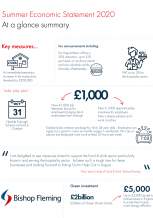Winter Economy Plan at a glance
Winter Economy Plan 2020 announcements made on 24 September 2020
Chancellor Rishi Sunak has unveiled his Winter Economy Plan, which entails a multibillion-pound package of financial support to help protect jobs and the economy from the impact of Covid-related restrictions.
The measures build on his March 2020 Budget and the Summer Economic Plan for jobs.
This new plan will help the country to get through the winter, in advance of a likely March 2021 Budget and the availability of a Covid vaccine.
Although the Chancellor has postponed his November Budget, and possible tax rises, he is still expected to announce the outcome of a Spending Review later this year.
The Winter Economy Plan includes the next version of the furlough scheme - the Jobs Support Scheme, as saving jobs and businesses remains a key priority.
The self employed income scheme will also continue.
The Winter Economy Plan documents can be downloaded from the Treasury website.
Support for workers
A new Job Support Scheme will be introduced from 1 November for six months to protect viable jobs in businesses who are facing lower demand over the winter months due to coronavirus.
Further information can be found in our separate article.
Employers will continue to pay the wages of staff for the hours they work - but for the hours not worked, the government and the employer will each pay one third of their equivalent salary.
This means employees who can only go back to work on shorter time will still be paid two thirds of the hours for those hours they can’t work.
In order to support only viable jobs, employees must be working at least 33% of their usual hours. The level of grant will be calculated based on employee’s usual salary, capped at £697.92 per month.
The Job Support Scheme will be open to businesses across the UK even if they have not previously used the furlough scheme, with further guidance being published in due course.
It is designed to sit alongside the Jobs Retention Bonus and could be worth over 60% of average wages of workers who have been furloughed – and are kept on until the start of February 2021. Businesses can benefit from both schemes in order to help protect jobs.
The Treasury has confirmed that the Job Support Scheme will not cover pension or National Insurance for workers.
Self-employed scheme - two new grants
In addition, the Government is continuing its support for millions of self-employed individuals by extending the Self Employment Income Support Scheme Grant (SEISS). An initial taxable grant will be provided to those who are currently eligible for SEISS and are continuing to actively trade but face reduced demand due to coronavirus.
The first grant will cover three months’ worth of profits for the period from November to the end of January next year. This is worth 20% of average monthly profits, up to a total of £1,875.
An additional second grant, which may be adjusted to respond to changing circumstances, will be available for self-employed individuals to cover the period from February 2021 to the end of April - ensuring support continues right through to next year.
Further information is provided in a separate article.
Tax cuts and deferrals
The government also announced it will extend the temporary 15% VAT cut for the tourism and hospitality sectors to the end of March next year.
In addition, up to half a million business who deferred their VAT bills will be given more breathing space through the New Payment Scheme, which gives them the option to pay back in smaller instalments. Rather than paying a lump sum in full at the end March next year, they will be able to make 11 smaller interest-free payments during the 2021-22 financial year.
On top of this, around 11 million self-assessment taxpayers will be able to benefit from a separate additional 12-month extension from HMRC on the “Time to Pay” self-service facility, meaning payments deferred from July 2020, and those due in January 2021, will now not need to be paid until January 2022.
Giving businesses flexibility to pay back loans
The burden will be lifted on more than a million businesses who took out a Bounce Back Loan through a new Pay as You Grow flexible repayment system. This will provide flexibility for firms repaying a Bounce Back Loan.
This includes extending the length of the loan from six years to ten, which will cut monthly repayments by nearly half. Interest-only periods of up to six months and payment holidays will also be available to businesses.
The government also intend to give Coronavirus Business Interruption Loan Scheme lenders the ability to extend the length of loans from a maximum of six years to ten years if it will help businesses to repay the loan.
In addition, the Chancellor also announced he would be extending applications for the government’s coronavirus loan schemes that are helping over a million businesses until the end of November. As a result, more businesses will now be able to benefit from the Coronavirus Business Interruption Loan Scheme, the Coronavirus Large Business Interruption Loan Scheme, the Bounce Back Loan Scheme and the Future Fund.
This change aligns all the end dates of these schemes, ensuring that there is further support in place for those firms who need it.
Brief recap – key changes previously announced this year:
- Flexible Furlough Scheme
- Self Employed Income Support Scheme
- Other Covid 19 financial support
- £10m for the tourist industry
- £1.57bn for cultural sector
- Zero rate VAT on PPE to 31 October 2020
- Corporation tax to remain at 19%
- CGT - 30 days to pay tax on sale of a UK residential property.
- IR35 roll out to private sector postponed until April 2021.
- Entrepreneurs' Relief - Lifetime limit reduced from £10m to £1m from 11 March 2020 (no change for Investors' Relief)
- Kickstart Jobs creation package for 16 to 24 year olds
Winter Economy Plan 2020 key measures announced:
- New Jobs Support Scheme for viable jobs to avoid redundancy
- The scheme will support viable jobs so 𝐞𝐦𝐩𝐥𝐨𝐲𝐞𝐞𝐬 𝐦𝐮𝐬𝐭 𝐛𝐞 𝐰𝐨𝐫𝐤𝐢𝐧𝐠 𝐚𝐭 𝐥𝐞𝐚𝐬𝐭 𝐚 𝐭𝐡𝐢𝐫𝐝 𝐨𝐟 𝐭𝐡𝐞𝐢𝐫 𝐧𝐨𝐫𝐦𝐚𝐥 𝐡𝐨𝐮𝐫𝐬 and be paid for that work, as normal, by their employer.
- The government, together with employers, will increase those people’s wages 𝐜𝐨𝐯𝐞𝐫𝐢𝐧𝐠 𝟐/𝟑 𝐨𝐟 𝐭𝐡𝐞 𝐩𝐚𝐲 𝐭𝐡𝐞𝐲 𝐡𝐚𝐯𝐞 𝐥𝐨𝐬𝐭 by reducing their working hours. The employee will keep their job. Anyone who as of yesterday is employed is eligible.
- Running November to April, all small & medium sized businesses are eligible to apply. But larger businesses only when their turnover has fallen. Businesses are eligible 𝐞𝐯𝐞𝐧 𝐢𝐟 𝐭𝐡𝐞𝐲 𝐡𝐚𝐯𝐞 𝐧𝐨𝐭 𝐩𝐫𝐞𝐯𝐢𝐨𝐮𝐬𝐥𝐲 𝐮𝐬𝐞𝐝 𝐭𝐡𝐞 𝐟𝐮𝐫𝐥𝐨𝐮𝐠𝐡 𝐬𝐜𝐡𝐞𝐦𝐞.
- Employers retaining furloughed staff on shorter hours can claim both the Jobs Support Scheme and the Jobs Retention Bonus. This significantly 𝐢𝐧𝐜𝐫𝐞𝐚𝐬𝐞𝐬 𝐭𝐡𝐞 𝐢𝐧𝐜𝐞𝐧𝐭𝐢𝐯𝐞𝐬 𝐭𝐨 𝐛𝐫𝐢𝐧𝐠 𝐛𝐚𝐜𝐤 𝐩𝐫𝐞𝐯𝐢𝐨𝐮𝐬𝐥𝐲-𝐟𝐮𝐫𝐥𝐨𝐮𝐠𝐡𝐞𝐝 𝐞𝐦𝐩𝐥𝐨𝐲𝐞𝐞𝐬.
-
Bounce Back Loans have given over a million small businesses a £38 billion boost to survive this pandemic. To give those businesses more time and greater flexibility to repay their loans, the government is introducing 𝐏𝐚𝐲 𝐀𝐬 𝐘𝐨𝐮 𝐆𝐫𝐨𝐰.
-
This means: Loans can be extended from six to ten years – nearly halving the average monthly repayment. Businesses who are struggling can now choose to make interest-only payments. Anyone in trouble can apply to suspend repayments altogether for up to six months.
-
To give businesses longer to apply for all of the government's loan schemes, it is extending all the deadlines to the end of the year. The Treasury is starting work on a new, successor loan programme, set to begin in January.
-
Outstanding tax bills can be paid over 12 months from January 2021
-
5% VAT rate - extended to 31 March 2021.
-
Nearly half a million businesses deferred more than £30 billion of VAT this year. Those payments are all due in one lump sum in March. Instead, the Chancellor is allowing businesses to 𝐬𝐩𝐫𝐞𝐚𝐝 𝐭𝐡𝐞𝐢𝐫 𝐕𝐀𝐓 𝐛𝐢𝐥𝐥 𝐨𝐯𝐞𝐫 𝟏𝟏 𝐫𝐞𝐩𝐚𝐲𝐦𝐞𝐧𝐭𝐬, with no interest to pay.
Related links
[Gary Mackley-Smith]







